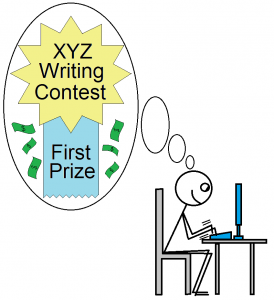You’ve heard there are writing contests out there. Wouldn’t it be great to win one? Should you devote time, energy, and possibly some money, to enter one or more of them? Let’s explore these questions.
 What’s in it for you?
What’s in it for you?
If you win, you get whatever prize the contest offers, generally a monetary prize. Some contests publish the winning entries. Also, there’s the prestige of being a contest winner. You’re “an award-winning author.” You can cite that contest among your achievements. When you submit stories for publication, you can mention in your cover letter that one of your tales won the XYZ Writing Contest.
Some contests offer second and third prizes that carry their own prestige too.
If you lose the contest, you also lose the entry fee you paid, if any. You may also experience a brief moment of disappointment, dejection, etc. This should be brief; you shouldn’t have your heart set on winning a contest. Losing should prompt no more than a fleeting twinge of sadness before you move on with life.
How do contests work?
Say you wanted to set up a writing contest yourself. How would you do it? You’d make sure you had prize money (or whatever type of prize you were going to offer) available. You’d advertise your contest, specifying the rules about how to enter, genre(s), submission guidelines, submission fees, any other restrictions, etc.
You’d assemble a panel of judges, people with demonstrated writing skills or other literary credentials, people you trust, who are willing to wade through numerous submissions. Realize these are people, not angels. They have biases, pet peeves, favorite styles, etc.
You have to decide whether to charge a fee for submissions. If your prize money comes from a giant pile o’ cash you have sitting around, you might not need to charge for entry. However, you might consider charging a fee (1) if there is no giant pile o’ cash, (2) if you can’t seem to lure the judges you want without paying them something, or (3) if you anticipate a tsunami-type volume of entries and need a way to limit them.
(There’s one other, less high-minded, reason you might charge a fee. If your motivation is not so much about finding and promoting undiscovered writers, but is more about swindling gullible rubes, you’d definitely require a fee for submissions and disguise your contest as legitimate.)
Lastly, you’d set up some way to have the judges review the submissions and render a judgement. You could set up some sort of voting mechanism; you could have stages of reviews where not all the first stage judges read every submission but only a subset. You could structure it in any of several ways.
That’s what you’d do if you were setting up your own writing contest, right? That’s pretty much how it happens.
How do you win?
Yeah…about that. If I knew a precise, never-fail method for winning contests, I wouldn’t be wasting time writing blog posts. Let’s restate that question as “How do you increase your odds of winning?”
Mathematically, if every submission had an equal chance, your odds would be one out of the number of entries. Like a well-run lottery, someone’s going to win, and it might be you.
However, the submissions don’t all have an equal chance, and you want to make yours rise above the rest. (In a scam contest run mainly to exploit vulnerable writers, you need to be a friend or relative of the main judge.)
For a legitimate contest, the way to increase your odds of winning is to (1) strictly observe all the contest rules for entering, and (2) follow all the same rules of story writing as you would if you were submitting to an editor for publication. Regarding (2), those story-writing rules consist of all the same advice I’ve been giving for years in this blog: strong and endearing main characters, high-stakes conflict, vivid setting, logical and well-paced plot, distinctive style and voice, etc.
Should you enter?
Obviously, it’s a question that depends on (1) whether you think a particular contest might be a scam, (2) whether there’s an entry fee, and if so, whether you’re willing to pay it, and (3) whether you have a story that meets the contest’s rules, and other factors specific to the situation. You’ll have to answer this one yourself.
One more thing…

 Oh, yeah, while you’ve got contests on your mind, don’t forget to vote for my story “After the Martians” and the book In a Cat’s Eye in the Preditors & Editors poll, in the Science Fiction Short Story and Anthology categories, respectively. The voting period closes on January 14th. See the instructions in last week’s blog post.
Oh, yeah, while you’ve got contests on your mind, don’t forget to vote for my story “After the Martians” and the book In a Cat’s Eye in the Preditors & Editors poll, in the Science Fiction Short Story and Anthology categories, respectively. The voting period closes on January 14th. See the instructions in last week’s blog post.
Whether you enter a contest or not, at least you’ll make your choice armed with a complete knowledge of the opinions of—
Poseidon’s Scribe

 After the Martians”
After the Martians”  tied for third (with two other stories) out of thirty-nine entries in the Science Fiction short story category. That’s wonderful! The story earned a Top Ten Finisher emblem, and it ended up in the top eight percent of the entries.
tied for third (with two other stories) out of thirty-nine entries in the Science Fiction short story category. That’s wonderful! The story earned a Top Ten Finisher emblem, and it ended up in the top eight percent of the entries. In a Cat’s Eye (in which my story “The Cats of Nerio-3” appears) didn’t do as well, placing seventeenth out of sixty in the Anthology category. Still, that’s in the top third of many, many entries. Thanks also to those who cast a vote for that anthology.
In a Cat’s Eye (in which my story “The Cats of Nerio-3” appears) didn’t do as well, placing seventeenth out of sixty in the Anthology category. Still, that’s in the top third of many, many entries. Thanks also to those who cast a vote for that anthology.
 What’s in it for you?
What’s in it for you?

 ten (top five, even) of the nominated horror short stories of 2015. I’m proud of “Ripper’s Ring” and gratified that readers think enough of it to send in their votes.
ten (top five, even) of the nominated horror short stories of 2015. I’m proud of “Ripper’s Ring” and gratified that readers think enough of it to send in their votes.![Pageflex Persona [document: PRS0000039_00001]](https://stevenrsouthard.com/wp-content/uploads/2015/10/HidesTheDarkTower-DigitalCover-FINAL2-200x300.jpg)



